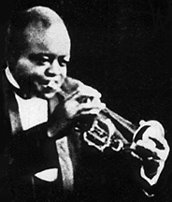King Oliver

Jazz legend King Oliver was born Joseph Oliver on this day in 1885 in New Orleans.
Beginning as a trombonist, Oliver learned some cornet from Bunk Johnson and began playing in dance bands (including some led by Kid Ory, who gave him his nickname "King") around New Orleans around 1907. He began to lead his own bands in 1912; somewhere in passing he encountered the teenaged Louis Armstrong, an up-and-coming cornetist, took a liking to him and showed him some tricks of the trade.
By the end of the teens, big, confident King Oliver was thought of as one of the three great New Orleans "jazz" cornetists, the other two being Bunk Johnson and Buddy Bolden. He played warmly, with an effect which suggested a human voice, and was a master at using a mute to achieve even more vocalistic effects.
Oliver left New Orleans in 1919 as the impact of jazz began to spread westward, and eventually ended up leading his Creole Jazz Band at Lincoln Gardens in Chicago in 1922. After a month, Oliver sent for Armstrong to join him as the band's second cornetist -- some say as a defensive move, since he knew Armstrong would surpass him in reputation. While the two-man cornet lineup was memorable in and of itself, Armstrong quickly established himself as the dominant talent on the jazz scene, eclipsing Oliver's gifts. Armstrong's pals (principally his future wife, Oliver's pianist Lil Hardin) attempted to talk him into going out on his own, but Armstrong felt he owed his debt to Oliver, and Oliver drew him into the famous 1923 recording sessions which would influence countless jazz players. Armstrong played his heart out, as Oliver's discipline kept the rest of the talented group (which included Hardin, Johnny and Baby Dodds) in line, keeping the balance between solo expressions and tight ensemble playing.
Convinced by Lil Hardin that Oliver was keeping him down musically and financially, Armstrong finally left the band in 1924, leaving Oliver to reorganize his remaining players as the Dixie Syncopators. He toured the country and continued to make superior recordings with such stars as Jelly Roll Morton, Clarence Williams and Red Allen. In 1931, however, Oliver's severe pyorrhea resulted in his teeth being removed; and since as a brass player he used his teeth to support his lip on his instrument, his playing days were officially over.
He continued to take bands around the South but the New Orleans style was beginning to fall out of favor, and he was marginalized by his own reputation as a pioneer -- just as the filmmaker D.W. Griffith was in Hollywood around the same time. Oliver eventually ended up working as a janitor in a pool hall in Savannah. Some poignant letters written by Oliver to his sister in New York near the end of his life survive, expressing his hope that he might be able to save enough money in his dime bank to buy a ticket to New York City. He only made it back posthumously; he died of a cerebral hemorrhage on April 8, 1938 in Savannah, Georgia, and was buried in Woodlawn Cemetery in the Bronx.
Labels: Jazz





0 Comments:
Post a Comment
Subscribe to Post Comments [Atom]
<< Home